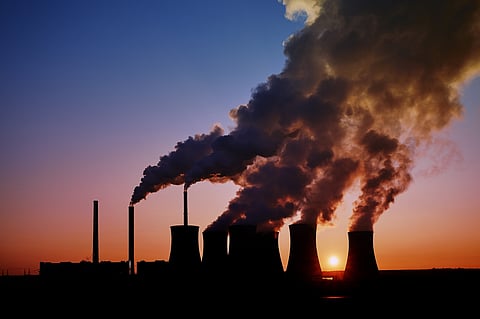

The world has made no progress in limiting temperature rise to 1.5 degrees Celsius above pre-industrial levels in 2023 compared to the previous year, with global greenhouse gas emissions increased by 1.3 per cent in 2023 relative to 2022, warned United Nations’ annual report tracking climate action.
The gap in implementing policies to meet the 2030 nationally determined contributions (NDC) remains unchanged from last year’s assessment, according to the UN Environment Programme’s (UNEP) Emissions Gap Report 2024. NDCs are national climate action plans updated every five years by countries to align with the Paris Agreement, which seeks to limit global temperature rise to well below 2°C, ideally to 1.5°C.
The report estimated the emissions gap — the difference between global greenhouse gas emissions under full implementation of current NDCs and the levels needed under least-cost pathways with stringent emissions reductions for 2030 and 2035.
The emissions gap for achieving the 2°C target remains at 16 gigatonnes of carbon dioxide equivalent (GtCO2e) for 2030 and 21 GtCO2e for 2035, the same as last year’s figures. For the 1.5°C target, the gaps for 2030 and 2035 are 24 GtCO2e and 32 GtCO2e, respectively — almost unchanged since last year’s assessment.
For conditional (requiring external financial support) and unconditional NDCs, the gaps for achieving the 1.5°C target stand at 19 GtCO2e and 22 GtCO2e by 2030 and 26 GtCO2e and 29 GtCO2e by 2035, mirroring last year’s values.
Even with full implementation of conditional and unconditional NDCs, emissions are projected to fall by only 4 per cent and 10 per cent by 2030 compared to 2019 levels, respectively. However, meeting the Paris Agreement targets requires emissions reductions of 28 per cent and 42 per cent by 2030 for 2C and 1.5C pathways, respectively.
Despite these targets, global greenhouse gas emissions continued to rise, increasing by 1.3 per cent in 2023 to 57.1 GtCO2e compared to 2022, with the power sector being the largest contributor, followed by transport, agriculture and industry.
“The world is moving on scaling up renewable energy and other low-carbon technologies, but not phasing out polluting activities fast enough. As a result, the stock of greenhouse gas emissions continues to grow and wreak havoc on the planet,” Avantika Goswami, programme manager, climate change at think tank Centre for Science and Environment, told Down to Earth.
If current NDCs are implemented without more ambitious pledges — due by February 2025 — the world could warm by up to 2.6°C by the end of the century. However, the UN report maintained that the 1.5°C target is still technically achievable.
To follow the least-cost pathway for 1.5°C, emissions need to be cut by 42 per cent by 2030 and 57 per cent by 2035 compared to 2019 levels. For the 2°C target, reductions of 28 per cent by 2030 and 37 per cent by 2035 are required.
Increased deployment of solar photovoltaic and wind energy could contribute 27 per cent of the total emissions reduction potential by 2030 and 38 per cent by 2035. Other actions, such as reducing deforestation, reforestation and improved forest management, could provide around 20 per cent of the potential in both years, the report highlighted.
The report also estimated that it will cost roughly $200 per tonne of CO2 equivalent to close the emissions gap for 2030 and 2035. Achieving these goals requires a six-fold increase in mitigation investment, alongside reform of the global financial system and strong private sector action.
To meet Net Zero targets, incremental investment from 2021 to 2050 is estimated to be between $0.9 trillion and $2.1 trillion annually, equivalent to 0.81-1.9 per cent of the global economy, valued at $110 trillion per year.
“The indiscriminate and persistent consumption of fossil fuels by wealthy countries despite big talk at global fora is a stain on their climate credentials and has depleted the carbon budget that would have allowed developing countries to even moderately raise emissions in their pursuit of prosperity,” Goswami added.
The report urged countries to adopt more ambitious NDCs, incorporating all gases covered by the Kyoto Protocol, including carbon dioxide, methane, nitrous oxide and F-gases (hydrofluorocarbons, perfluorocarbons and sulphur hexafluoride). Many countries, including several major economies, have yet to explicitly include non-carbon dioxide gases in their NDCs or long-term targets, according to a 2022 paper published in the journal One Earth.
The report also recommended that emerging markets and developing economies outline the international support and finance needed to meet ambitious NDC targets for 2035.
“At 29th Conference of Parties (COP29) to the United Nations Framework Convention on Climate Change (the 2024 climate summit to be held in November 2024 in Baku, Azerbaijan), leaders must respond to the latest science and act on their fair share of responsibility—especially wealthier nations who have fuelled this crisis for decades,” Harjeet Singh, climate activist and global engagement director for the Fossil Fuel Non-Proliferation Treaty Initiative, said in a statement.
It is time to stop shifting responsibility and start delivering real climate action with the scale, speed and finance that this moment demands, the statement added.